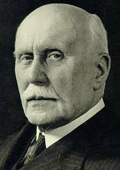 |
Henri-Philippe-Bénoni-Omer-Joseph Pétain
b. 24 Apr 1856, Cauchy-à-la-Tour, Pas-de-Calais
d. 23 Jul 1951, Port-Joinville, Île d'Yeu |
| Title: |
Chef de l'État français (Head of the French State) |
| Term: |
11 Jul 1940 - 20 Aug 1944 |
| Chronology: |
10 Jul 1940, all powers are given to the government of the Republic under the authority and signature of Marshal Pétain, Constitutional Law of 10 Jul 1940 ("Loi constitutionnelle du 10 juillet 1940"), passed at the session of the Assemblée nationale (National Assembly), Grand Casino de Vichy, Vichy [1][2] |
| |
11 Jul 1940, assumed the functions of office as proclaimed by the Constitutional Act No. 1 of 11 Jul 1940 ("Acte constitutionnel n° 1 du 11 juillet 1940") [3] (see note) |
|
20 Aug 1944,
ceased to exercise the functions of office upon capture by a belligerent force, Château de Morvillars, near Belfort, France [4][5] |
| Biography: |
| Son of a prosperous farmer; educated at Jesuit and Dominican colleges; studied at the Military Academy of Saint-Cyr (École spéciale militaire de Saint-Cyr) (1876-1878); commissioned second lieutenant (1878); promoted to lieutenant (1883); continued education at the École Supérieure de Guerre (1888-1890); promoted to major (1890), captain (1890); taught at the École Supérieure de Guerre (1901-1910); promoted to colonel (1910), brigadier general (1914), major general (1914), lieutenant general (1914), general (1915); led successful defence of Verdun against the Germans (1916); headed the General Staff (1917); was made commander-in-chief of the armies of the North (15 May 1917); promoted to the rank of Marshal of France (19 Nov 1918); nominated vice president of the High Council of War (1920-1931) and general inspector of the army (1922); elected to the Académie française (1929; excluded in 1945); served as minister of war (9 Feb 1934 - 8 Nov 1934) and minister of state (1 Jun 1935 - 7 Jun 1935), ambassador to Spain (1939-1940); following the German invasion of France in 1940, was appointed vice president of the Council of Ministers (18 May 1940 - 16 Jun 1940) and minister of state (18 May 1940 - 16 Jun 1940); President of the Council of Ministers (16 Jun 1940 - 18 Apr 1942); concluded armistice with the Germans (22 Jun 1940); established government in Vichy (2 Jul 1940); assumed full legislative and executive powers as Chef de l'État français (11 Jul 1940); established a Fascist-oriented government notorious for collaboration with the Nazi Germany; after the Allies landed in France, he was forced by the Germans to leave Vichy and moved to Château de Morvillars, near Belfort (20 Aug 1944), and eventually was taken across the French-German border (7 Sep 1944); arrived to Sigmaringen, Germany (10 Sep 1944), then went to Switzerland, but returned to France (26 Apr 1945) to stand trial for treason; was found guilty and sentenced to death (15 Aug 1945); sentence was commuted to life imprisonment; was imprisoned on Île d'Yeu, an island off the coast of Vendée, where he died. |
| Biographical sources: "Un certain Philippe Pétain", by Pierre Bourget (Casterman, 1966); "Philippe Pétain", by Jacques Isorni (La Table ronde, 1973), 2 vols.; "Petain et la fin de la collaboration: Sigmaringen 1944-1945", by Henry Rousso (Editions Complexe, 1984) |
| |
| [1] |
Journal officiel de la République française. Débats parlementaires. Assemblée nationale. N° 43. Jeudi 11 Juillet 1940. P. 1-5. |
| [2] |
Journal officiel de la République française. Lois et Décrets. N° 167. Jeudi 11 Juillet 1940. P. 4513. |
| [3] |
Journal officiel de la République française. Lois et Décrets. N° 168. Vendredi 12 Juillet 1940. P. 4517. |
| [4] |
"Petain et la fin de la collaboration", op. cit., 78. |
| [5] |
Prior to his forced removal from Vichy, Pétain received the diplomatic corps in audience and delivered to them a message addressed to Adolf Hitler, which ends with "J'élève une protestation solennelle contre cet acte de force, qui me place dans l'impossibilité d'exercer mes prérogatives de chef de l'État français." ("Petain et la fin de la collaboration", op. cit., 79). Before leaving French territory (7 Sep 1944), he addressed to Hitler another statement and protest, in which he declared that he remains in the impossibility of exercising the functions of Head of the French State: "... et je constate que je reste dans l'impossibilité d'exercer les fonctions de chef de l'État français, dont j'ai été investi par l'Assemblée Nationale." ("Un certain Philippe Pétain", op. cit., 258). |

